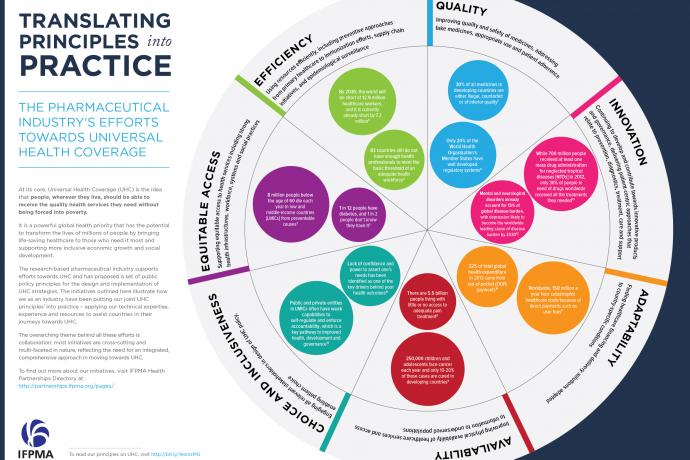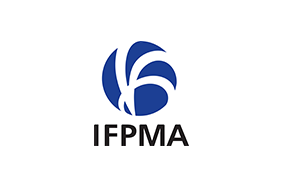IFPMA Statement on the adoption of the Sustainable Development Goals (SDGs)
Published 09-27-15
Submitted by International Federation of Pharmaceutical Manufacturers & Associations
 Translating principles into practice - the pharmaceutical industry's efforts towards Universal Health Coverage (UHC)
Translating principles into practice - the pharmaceutical industry's efforts towards Universal Health Coverage (UHC)The Sustainable Development Goals (SDGs) mark the start of the widest ever concerted global effort to transform our world by 2030. Reflecting the reality of an integrated world, the SDGs take a holistic and multifaceted approach, interweaving health considerations into all of the goals. The research-based pharmaceutical industry welcomes this approach and confirms its commitment to achieving the SDGs and in so doing, contribute to inclusive, equitable, economically productive and healthy societies.
The SDGs, and in particular Goal #3[1] and its targets, offer an opportunity to inject a new vision that recognizes health as a driver of global economic growth, whilst building upon the very rich heritage and achievements of the Millennium Development Goals (MDGs), where we, as a global health partner, helped bring about successful health outcomes such as increased antiretroviral access to HIV patients and significant progress on decreasing child mortality.
However, there remains much work to be done. To achieve healthy lives at all ages, health systems should focus on long-term sustainable frameworks to prevent and manage infectious-, chronic-, and injury-related conditions. Achieving healthy lives at all ages requires the commitment to embed health within all policy areas, recognizing that the choices we make in many fields from the environment to transportation to education will ultimately impact well-being. It also requires a parallel commitment to foster an innovative eco-system in life sciences that will continue to enable the research, development and scientific partnerships that lead to new, patient-centered medical interventions and health services.
Sitting at the core of Goal #3 lays the powerful concept of Universal Health Coverage (UHC), of which the research-based pharmaceutical industry is a strong advocate. Fulfilling the vision of UHC will require investing in health systems strengthening, including resilience to health emergencies, provision of integrated care and services, and a focus on prevention of chronic and injury-related conditions. UHC is possible through broader health care innovation across the public and private sectors that enables access and improves quality, while at the same time being flexible to generate tailored and country-owned solutions. UHC is the result of a concerted approach involving coordination of policies at government level, financing solutions, private sector involvement, and innovation.
The research-based pharmaceutical industry interprets the vision of the SDGs implementation as one that involves all relevant stakeholders, including academia, civil society, and the private sector from the onset. Indeed, the MDGs taught governments, businesses and civil society how to work together. Lessons learned and applied since 2000 show how crucial partnerships are in facilitating the architecture of many interventions on extreme poverty, education, gender equality, and sustainability and we are pleased that this has been captured, for the next 15 years, in Goal #17[2]. Multiple sectors should continue to join forces to strengthen healthcare systems, identify sustainable financing mechanisms, and reduce the add-on costs of health products and services along the supply chain.
Partnerships in the health sector are by no means a new phenomenon and should be further encouraged and developed while the global health community moves along the road to 2030. There are currently more than 250 health partnerships in which our industry is involved. These bring together different actors to improve the lives of people suffering from diseases such as HIV/AIDS, malaria and tuberculosis, non-communicable diseases (NCDs) and neglected tropical diseases (NTDs), as well as cross-cutting challenges like women and children’s health.
The research-based pharmaceutical industry is just one player in the health community. Inspired by the breadth and ambition of the SDGs, we stand ready to continue working together in existing partnerships and to build new collaborations in an effort to ensure that the SDGs are translated from aspiration to action, and that we build a future that we can be genuinely proud of.
For more: http://www.ifpma.org/events/statements.html
[1] SDGs, Goal 3: “Ensure healthy lives and promote well-being for all at all ages”
[2] SDGs, Goal 17: “Strengthen the means of implementation and revitalize the global partnership for sustainable development”

International Federation of Pharmaceutical Manufacturers & Associations
International Federation of Pharmaceutical Manufacturers & Associations
The International Federation of Pharmaceutical Manufacturers & Associations (IFPMA) represents research-based pharmaceutical companies and associations across the globe. Based in Geneva, IFPMA has official relations with the United Nations and contributes industry expertise to help the global health community find solutions that improve global health.
Research-based pharmaceutical companies make a unique contribution to global health as innovators of life-saving and life-changing medicines and vaccines, which improved millions of lives around the world. Both IFPMA and its companies are involved in hundreds of partnerships, including the Access Accelerated initiative, a partnership of over 20 biopharmaceutical companies developing innovative and sustainable solutions to improve access to non-communicable disease (NCDs) treatment and care in low- and middle income countries. Access Accelerated also partners with the World Bank and the Union of International Cancer Control to help address the full spectrum of access barriers to NCD medicines. These partnerships involve the discovery of treatments that threaten health security or unduly put a burden on low-income countries, as well as support Universal Health Coverage (UHC) by expanding access to medicines and vaccines and strengthening health systems and in doing so, contribute to the Sustainable Development Goals (SDG 3 and SDG 17).
IFPMA hosts the Secretariat of the AMR Industry Alliance, a coalition of over 100 biotechnology, diagnostic, generics and research-based biopharmaceutical companies and trade associations that was formed to drive and measure industry progress to curb antimicrobial resistance. IFPMA also played a key role in establishing the AMR Action Fund, a ground-breaking initiative involving over 20 biopharmaceutical companies, that aims to bring 2-4 new antibiotics to patients by 2030.
Other initiatives supported by IFPMA include: The African Global Health Leaders Fellowship, the Africa Young Innovators for Health Award, and Fight the Fakes.
More from International Federation of Pharmaceutical Manufacturers & Associations

